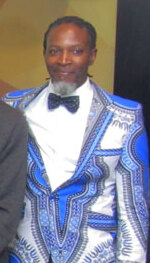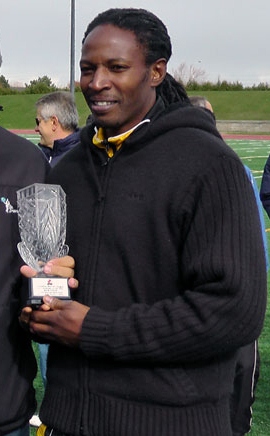Rick Titus (soccer) facts for kids

Titus in 2019
|
|||
| Personal information | |||
|---|---|---|---|
| Full name | Rick Wayne Titus | ||
| Date of birth | 10 March 1969 | ||
| Place of birth | Mississauga, Ontario, Canada | ||
| Height | 1.85 m | ||
| Playing position | Defender | ||
| Youth career | |||
| North Mississauga SC | |||
| Senior career* | |||
| Years | Team | Apps† | (Gls)† |
| 1988–1995 | Toronto Italia | ||
| 1995 | Scarborough Astros | 8 | (0) |
| 1996 | St. Catharines Wolves | 9 | (0) |
| 1996–1997 | Toronto Shooting Stars (indoor) | 20 | (12) |
| 1996–1997 | Edmonton Drillers (indoor) | 13 | (4) |
| 1997–1998 | Toronto Lynx | 49 | (1) |
| 1997–1998 | Montreal Impact (indoor) | 17 | (2) |
| 1997–1998 | Buffalo Blizzard (indoor) | 15 | (7) |
| 1998 | Edmonton Drillers (indoor) | 11 | (2) |
| 1998–1999 | Quan Li | ||
| 1999 | Philadelphia KiXX (indoor) | 14 | (3) |
| 1999 | Hershey Wildcats | 17 | (0) |
| 1999 | Staten Island Vipers | 11 | (0) |
| 1999–2000 | Edmonton Drillers (indoor) | 48 | (29) |
| 2000–2001 | Buffalo Blizzard (indoor) | ||
| 2000–2001 | Vancouver 86ers/Whitecaps | 44 | (1) |
| 2000 | → Toronto Olympians (loan) | 1 | (0) |
| 2002 | Colorado Rapids | 25 | (0) |
| 2003 | Charleston Battery | 15 | (0) |
| 2004 | Edmonton Aviators | 6 | (0) |
| 2004 | Toronto Lynx | 1 | (0) |
| 2004 | Charleston Battery | 12 | (0) |
| 2005–2008 | Toronto Lynx | 61 | (0) |
| 2008 | → Toronto FC (loan) | 1 | (0) |
| 2008–2010 | Italia/York Region Shooters | 45 | (1) |
| National team | |||
| 2002 | Trinidad and Tobago | 4 | (0) |
| Teams managed | |||
| 2005–2015 | North Mississauga SC | ||
| 2016–2017 | UTM Eagles | ||
| 2017– | Master's Futbol | ||
| 2017–2019 | Caribbean Stars AC (indoor) | ||
| 2019 | Mississauga MetroStars (indoor) | ||
|
|||
Rick Wayne Titus (born March 10, 1969) is a soccer coach and former professional player. He was born in Canada and also has roots in Trinidad and Tobago. Rick played as a defender. He used to be the head coach for the Masters FA League 1 team, which won a championship in 2019. He also coached the University of Toronto Mississauga soccer team.
Rick has Indigenous family history. He has announced that he will be changing his name to Netshetep Ma'at, which is an Ancient Egyptian name. He will also use the Indigenous name Songan Ohitekha Tawa El, meaning Strong Brave Sun.
During his time as a player, Rick played at all levels of soccer in North America. He started in Canada's National Soccer League. Then he moved to the USL A-League and even reached the highest level, Major League Soccer (MLS). After playing in the MLS, he moved between different United Soccer Leagues clubs. He later returned to the MLS for one game when he was 39 years old. He finished his outdoor career in the USL Premier Development League and Canadian Soccer League. Rick also played indoor soccer for several teams in the National Professional Soccer League. He also played for the Trinidad and Tobago national football team on the international stage.
After he stopped playing soccer professionally, Rick became a coach. He first coached as a player/assistant coach for the Toronto Lynx in 2007. Later, he joined the coaching staff at the TFC Academy as the U14 head coach. He then started coaching in League1 Ontario with North Mississauga SC.
Contents
Rick's Playing Career
Starting His Soccer Journey (1986–1996)
Rick Titus played college soccer for the University of Toronto. After college, he signed with the Toronto Blizzard. However, due to money problems, he left after three months. In 1988, he joined Toronto Italia in the National Soccer League. He played for Italia until 1995.
In 1995, Rick moved to the Scarborough Astros during the season. He helped the Astros reach the Umbro Cup finals, but they lost to the St. Catharines Wolves in a penalty shootout. In 1996, Rick signed with the St. Catharines Wolves. He helped them win the Umbro Cup by finishing first. He played in the two-game final against his old team, Toronto Italia. The Wolves won the cup, even though they lost the final match by a large score.
Rick also started playing indoor soccer in 1996. He joined the Toronto Shooting Stars in the National Professional Soccer League. During that season, he was traded to the Edmonton Drillers. He played for the Drillers three different times and became a league all-star in the 1999–2000 season. After the Edmonton team closed, Rick was chosen by the Buffalo Blizzard. When the Blizzard team also closed, the Milwaukee Wave picked Rick in a special draft in 2001.
Playing in the USL A-League (1997–2001)
In 1997, Rick joined the new Toronto Lynx team in the USL A-League. He played for the Lynx for two years and was named their best defensive player in both 1997 and 1998. During the winter breaks, he continued to play indoor soccer. In 1997, he played for the Montreal Impact and was later traded to the Buffalo Blizzard.
In 1998, Rick went to China to play for a team called Quan Li. His former Lynx teammate, Gong Lei, was the manager of that team. After a short time in China, Rick returned to the NPSL. He played for Philadelphia KiXX during the 1998–1999 indoor season.
Rick then moved to the Hershey Wildcats for the 1999 A-League season. However, he was traded to the Staten Island Vipers during the season. On June 13, 2000, Rick signed with the Vancouver 86ers. He was named Vancouver's best defensive player in 2000 and was also chosen for the Second Team All A-League. In 2001, he was named the A-League Defender of the Year and made the First Team All A-League.
After the 2000 A-League season, Rick was loaned to the Toronto Olympians in the Canadian Professional Soccer League. He played his first game for them in the Open Canada Cup semi-final. His team won that game in a penalty shootout. He also played in the Open Cup final against his old team, St. Catharines, and won the cup. In the playoffs, he scored the only goal in the semi-final, helping Toronto reach the finals. However, the Olympians lost the final game.
Time in MLS and USL First Division (2002–2006)
Rick's strong play caught the attention of Major League Soccer (MLS) teams. In 2002, he signed with the Colorado Rapids. He started in all 25 games he played and won the ADT Defensive Player of the Year award at the end of the season. In October 2002, the Rapids released him.
On March 12, 2003, Rick signed a two-year contract with the Charleston Battery. He helped them win the 2003 USL A-League Championship. After that season, he asked to leave his contract to join the Edmonton Aviators, where he signed a three-year deal.
However, he was released from his contract with Edmonton shortly after. On June 19, 2004, he returned to the Toronto Lynx. After less than a week, he left the Lynx again due to disagreements with the team's management. He then rejoined the Charleston Battery for the rest of that season.
The next season, Rick came back to the Lynx for his third time playing for them. In 2006, he became the team's vice-captain. He played in the Open Canada Cup final against Ottawa St. Anthony Italia. At the end of the season, he was named the 2006 Toronto Lynx Most Valuable Player. He was also chosen for the United Soccer League's team of the week four times.
Playing in PDL and CSL (2007–2010)
After the 2006 season, the Lynx team decided to move down two divisions to the Premier Development League (PDL) because of money reasons. Rick was one of the few experienced players who stayed with the Lynx for the 2007 season. He was named a player and assistant coach for the team. In 2008, Rick helped the Lynx reach the playoffs for the first time since 2000. Unfortunately, they lost to the Cleveland Internationals in a close game.
In 2008, Rick was loaned to Toronto FC for one game in Major League Soccer against Chivas USA. This happened because Toronto FC had many players away on international duty. Rick was not paid for this game to keep his amateur status. After the PDL season ended, he returned to the Canadian Soccer League and signed with the York Region Shooters. While with York Region, he helped them win the International Division title in 2008 and the regular season title in 2010. He was also named the CSL Defender of the Year in 2010.
Playing for His Country
Rick Titus played for the Trinidad and Tobago national team. His first international game was on November 15, 2002, against St. Kitts and Nevis national football team. This game was part of the qualifiers for the 2003 CONCACAF Gold Cup. He played in four Gold Cup qualifier matches in 2002.
Rick's Coaching Career
In 2012, Rick Titus coached the 98 boys youth team at North Mississauga Soccer Club. This team went on to win the Ontario Cup and then the Canadian National Championship. The 98 boys team was also named the top sports team at the Mississauga Sports Council banquet.
In 2007, Rick got his first experience coaching a professional club as an assistant coach for the Toronto Lynx in the USL Premier Development League. He worked under coach Duncan Wilde. Later, he became the head coach for the TFC Academy U14 team. He also worked as a scout for young players in the Mississauga and Brampton areas.
In 2016, Rick became the head coach for North Mississauga SC in League1 Ontario. He was also named the head coach for the University of Toronto Mississauga men's team. In 2017, he became the head coach for Masters FA Saints. During the 2017 winter season, he was also the head coach for Caribbean Stars AC in the Arena Premier League. In the 2021 League 1 Ontario season, Rick received a one-year suspension due to an argument with game officials.
In 2019, he took over from Phil Ionadi as the head coach for the Mississauga MetroStars in the Major Arena Soccer League. In 2019, he led Masters FA to win the League 1 Ontario Championship. In 2021, his team reached the semi-finals of the League 1 Ontario Championship, where they lost to the Guelph team, who went on to win the championship that year.


